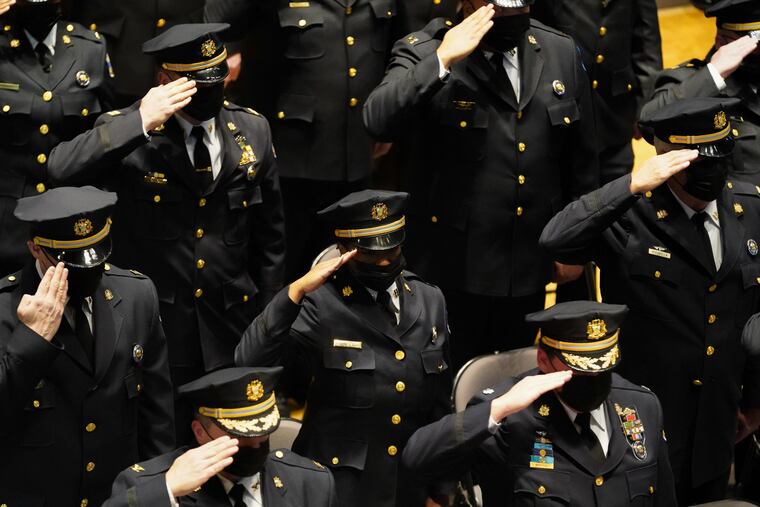Repeal Philly police residency requirements to boost the force amid murder crisis | Opinion
In an already trying time, the residency requirement unnecessarily limits the police department’s recruitment efforts and, therefore, public safety.

Philadelphia is reeling from an unprecedented and unacceptable surge in murders. In the wake of record homicides last year, our city’s leaders continue to search for and implement measures to control the harrowing situation — all in the midst of a pandemic and racial justice reckoning. Adding to this storm, historic staffing shortages limit the Philadelphia Police Department’s options to address the violence.
There are approximately 420 vacancies in the Police Department. An additional roughly 630 officers, a record high, are considered “injured on duty” and unable to work in any capacity. Including officers who are on restricted or limited duty, the department is operating with about 5,000 sworn officers – roughly 1,380 below its authorized staffing level. Not to mention, an additional 834 officers will soon depart the force under the city’s retirement DROP program. This shortage means the department is spread thin and cannot easily deploy targeted enforcement actions, community foot patrols, and other tactics that improve public safety. Yet with an academy class of only 48 recruits, hope for a quick change is just that.
While dealing with this crisis we must begin listening to those most affected by the violence. Black and brown people overwhelmingly bear the brunt of the murder toll, representing more than 90% of Philadelphia’s victims last year. During my career as a Philadelphia prosecutor, victims’ families — again, mostly Black and brown people — consistently expressed a want for a better-trained, respectful, and compassionate police force with transparency and accountability, and that officers be present on their streets to ensure safety in their neighborhoods. In my current role, I continue to hear the same message from community leaders.
» READ MORE: Pro/Con: Should Philly police be required to live in the city? | Opinion
Recent national polls echo the view that Black communities do not favor a reduction of their police forces at this time. To be clear, these data also suggest that the majority of Black communities undeniably want meaningful changes to policing that are long overdue. Public safety and police reform are not mutually exclusive, and most of our collective voice is acknowledging this crisis moment when basic public safety is paramount.
Right now, our leaders can listen and respond by helping the Police Department sufficiently staff our police force by amending or repealing the mandatory one-year residency requirement for police recruits. The well-intentioned ordinance requires any applicant to reside in Philadelphia for at least one year prior to being hired. As the argument goes, the ordinance would promote diversity, provide new economic opportunities to Philadelphians, and enlist individuals who have a greater investment in the communities they would serve.
Yet it is more challenging than ever for police departments to attract recruits. It is even more difficult to attract diverse candidates who may think that the department isn’t a place for them, or who may experience disapproval from their communities for enlisting. In an already trying time, the residency requirement unnecessarily limits the department’s recruitment efforts and, therefore, public safety.
The ordinance is not solely to blame for the bleak outlook — factors like the pandemic, the broader employment market, and the current public perception of police all undoubtedly affect recruitment. Further, fairness and efficacy of the application process, including the psychological evaluations and lie detector portions, should be scrutinized. Nevertheless, the residency requirement is low-hanging fruit, ripe for culling with relative ease and haste.
Why not give new hires a defined grace period to move into the city after they get the job? Why not give hiring preference to Philadelphians but then allow non-Philadelphians to be considered only after that list is exhausted? Ask yourself: Who in their right mind would move to another city and wait a year on the mere possibility of a job as a police officer? And do we believe that a candidate who has been here for one year will necessarily outperform any other candidate?
Police work is stressful, tiring, dangerous, and sometimes life-threatening. But it’s also a rewarding, fulfilling, and well-paying career that will attract those eager to join our evolving criminal justice system for the right reasons. The residency requirement forecloses any chance that public servants would relocate here for the purpose of serving this great city — as I did more than 14 years ago.
In this moment, the Police Department should be able to recruit wherever there are qualified individuals who are ready to serve our citizens, from North Philadelphia to neighboring counties and beyond. That includes historically Black colleges and universities and other jurisdictions near and far where individuals will be drawn to all that Philadelphia offers.
As a city, we must continue to have conversations and action regarding the responsibilities, scope, and civilianization of our Police Department in the 21st century, and I hope we listen to all of our voices during this process. But we must do all we can to stop the unrelenting violence, including repealing or amending the one-year residency requirement for police recruits.
Adam Geer is the deputy inspector general for public safety for the City of Philadelphia.